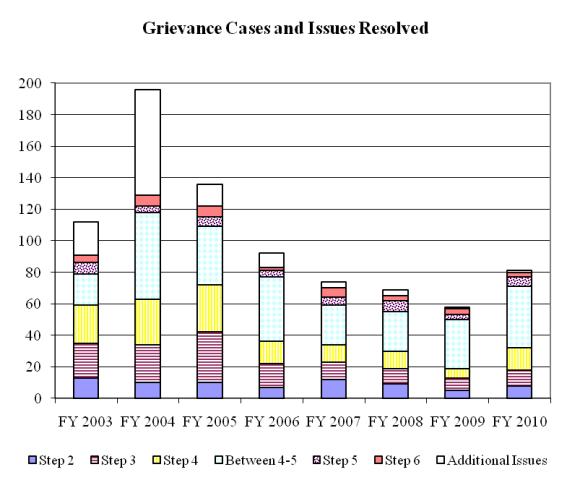Compendium of Budget Information for the 2011 General Session
| Retirement & Independent Entities Appropriations Subcommittee | |||||||||||||||||||||||||||||||||||||||||||||||||||||||||||||||||||||||||||||||||||||||||||||||||||||||||||||||||||||
| Subcommittee Table of Contents | |||||||||||||||||||||||||||||||||||||||||||||||||||||||||||||||||||||||||||||||||||||||||||||||||||||||||||||||||||||
Agency: Career Service Review Office Function The Career Service Review Office (CSRO) is a quasi-judicial body that administers the state's grievance and appeals process. The Office hears cases related to decisions about promotions, dismissals, demotions, suspensions, written reprimands, wages, salary, violations of personnel rules, issues concerning the equitable administration of benefits, reductions in force, and disputes concerning abandonment of position. The goal is to resolve grievances at the lowest possible managerial level. The Board has no jurisdiction over classification grievances, which are governed by Department of Human Resource Management. The CSRO conducts pre-hearing conferences in an attempt to mediate many of the cases which come before them. When necessary they conduct jurisdictional, evidentiary, and appellate levels of adjudications as a means of resolving disputes The CSRO conducts hearings as efficiently as possible using contracted hearing officers. The only ongoing salary costs are for the administrator and a secretary. Statutory Authority UCA 67-19a-101 defines 'grievance' as a complaint by a career service employee concerning any matter touching upon the relationship between the employee and his/her employer; and any dispute between a career service employee and his/her employer. UCA 67-19a-201 requires the governor to appoint the administrator who may assign hearing officers to each case; subpoena witnesses, documents, and other evidence; and quash unreasonable subpoenas. UCA 67-19a-202 gives the office jurisdiction to serve as the final administrative body to review appeals from career service employees and agencies. UCA 67-19a-203 requires the office to make rules governing the appeals process. UCA 67-19a-303 delineates employees' rights in a grievance and appeals procedure. Employees may have representation, use a reasonable amount of time during work hours to confer with the representative, and may not have reprisals taken against them for using grievance procedures. UCA 67-19a-401 through 406 list the procedural steps to be followed by the employee and the employer, including the administrator's power to require a pre-hearing conference. Intent Language
Performance One Way of measuring this program's workload is by tracking the number of grievance cases resolved by year, as shown in the figure below. Whils this is one factor, other factors should also be considered such as complexity of cases, which has increased in recent years as more grievants hire attorneys.  Steps: 2 = immediate supervisor level; 3 = division/agency director level; 4 = department head level; Between 4-5 = mediation forum; 5 = evidentiary hearing; 6 = appellate review/board; 'Additional Issues' = some cases have multiple issues involved. Measure: Number of grievances cases and issues resolved. Goal: Resolve grievances at the lowest possible level; hold hearings in the fairest and most efficient way possible. Methodology: This is a measure of the number of cases resolved and the level at which they are resolved by the CSRO. Measure Type: Output and outcome. Note: The number of grievances increased by 42 percent in FY 2004 but has declined since only to increase once again in FY 2010. Reasons for the FY 2004 and FY 2010 increases are uncertain, but the office states that grievances tend to trend upward after multiple years of no or low pay increases. The office is making an effort to reduce the number of grievances heard in an evidentiary hearing (Step 5) through mediation and closer scrutiny of grievances. A growing percentage of cases are resolved under mediation, as shown in the chart under 'Between Steps 4 -5.' Funding Detail
|